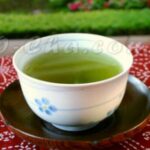 Researchers from Tohoku University, in Sendai, Japan report the results of the Ohsaki Cohort 2006 Study.
Researchers from Tohoku University, in Sendai, Japan report the results of the Ohsaki Cohort 2006 Study.
First, the details.
- 42,093 Japanese adults were studied.
- Information on daily green tea consumption, psychological distress (assessed using the Kessler 6-item psychological distress scale), and other lifestyle factors was collected using a questionnaire.
- Kessler-6 is a screen for psychological distress, with a score less than 19 defining serious psychological distress.
- The findings were adjusted for age, gender, history of disease, body mass index, cigarette smoking, alcohol consumption, time spent walking, dietary factors, social support, and participation in community activities.
And, the results.
- A little less than 7% of the participants had psychological distress.
- Greater green tea consumption was associated with less psychological distress after adjusting for age and gender.
- The odds of developing psychological distress among those who drank at least 5 cups of green tea each day was significantly less than in those who consumed fewer than 1 cup per day.
The bottom line?
This is the first large study to evaluate the relationship between green tea and stress (Kessler score: at least 13 out of 24).
It’s possible that the benefits reported here are due to catechin polyphenols or other ingredients in green tea. On the other hand, Elizabeth Scott, who writes for About.com’s Guide to Stress Management, lists drinking green tea as one of several lifestyle activities that help lower stress.
The other activities include listening to music, taking a shower, eating a balanced breakfast, writing in a journal, a morning walk, and yoga.
10/3/09 20:55 JR